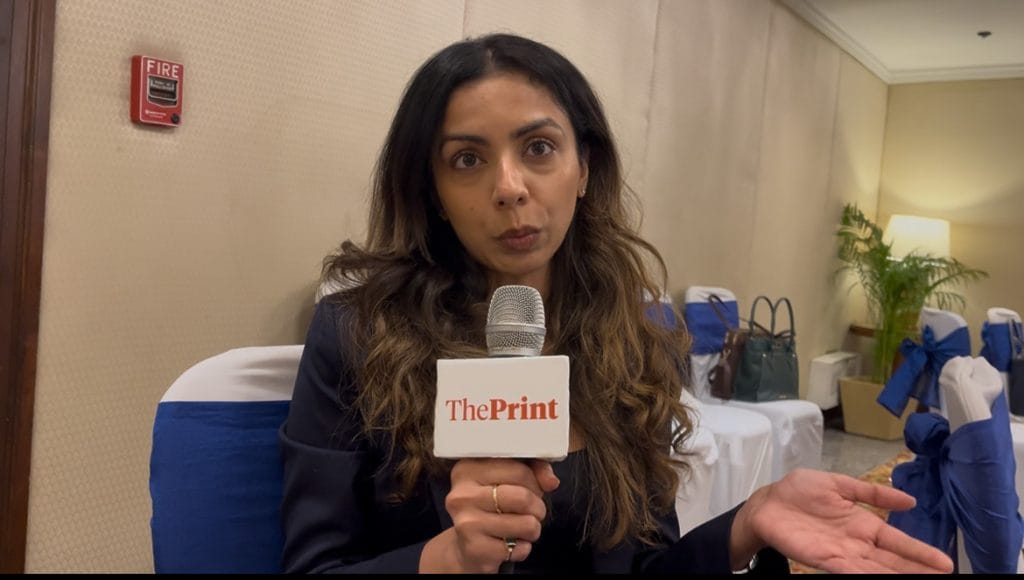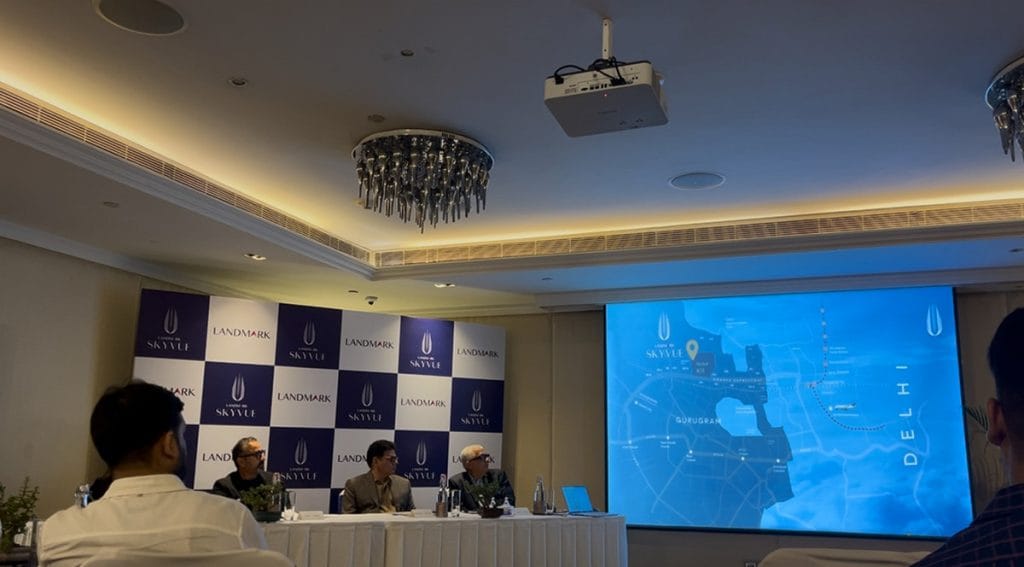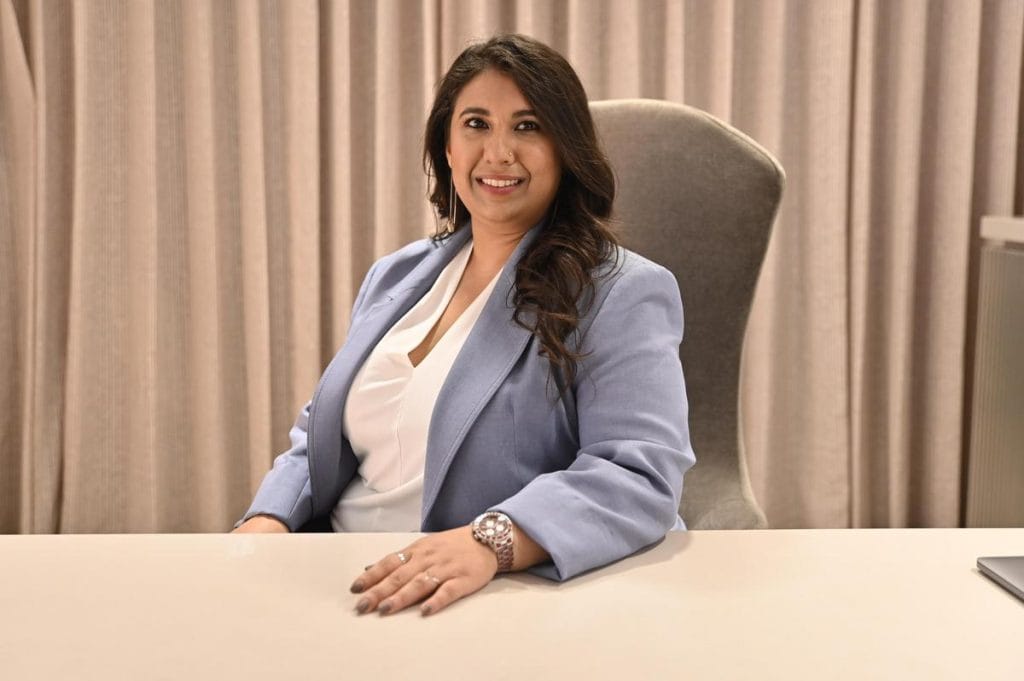New Delhi: At a press conference announcing the Landmark Group’s latest project, a set of luxury residential towers, Roshy Chhillar was conspicuous — but entirely unintentionally. The immaculately dressed 29-year-old was the only woman in an all-male sea of grey hair. Landmark Skyvue, a Rs 400 crore project on the Dwarka Expressway in Gurugram, bore her imprint, like in the endless expanse of space devoted to the wellness centre.
But no questions were directed toward her.
Instead, all attention went to her father, founder Sandeep Chhillar, and Landmark’s head of sales.
She may have stood out, yet her being overlooked was nothing new in real estate — a longtime male bastion where women are only now trickling in. It was only in 1998, when the National Housing and Habitat Policy expanded the role of the private sector, that the profession was given a measure of legitimacy. But even then, it continued to be regarded as a ‘dirty business’ with money flowing through unauthorised channels and shadowy men striking under-the-table deals.
An assumption was cemented: it’s not safe for women to be in the business, let alone on sites. Now, however, a new generation of young, girlboss-esque leaders is coming to the fore. And tradition has helped make this happen.
Real estate has predominantly been a family-owned enterprise, with big brands flaunting their generational ties. As a result, the second generation of directors and honchos has stepped into the spotlight — and many of them are women. Beyond those with family legacies, however, the numbers are not particularly inspirational. A January 2025 study by Max Estates and Tandem Global Consulting found that of the 7.1 crore real estate workforce, just 70 lakh are women, making it one of the “least inclusive sectors”.

“Obviously there are certain advantages I carry. There’s also a difference in tier-1 cities when it comes to how women are perceived,” Chhillar said. “But the natural inclination is that a woman can’t be a developer.”
After studying economics at NYU, she went on to do a master’s in real estate at Cornell. She then worked for a year at real estate brokerage firm Savills before realising that her family business was the “right fit” for her.
At Delhi’s ITC Maurya, the 5-star hotel hosting the Landmark launch, the press conference was followed by the usual meet-and-greet. A reporter with a leading magazine asked if she liked the listicle she had just featured in — a who’s who of young gamechangers in real estate.
She did. But “there are only two women,” she remarked.
The path was laid for me, and I chose to take it. But when I joined, it was overwhelming. It was not easy, it did take time for me to earn respect. Then, men didn’t know what to say. In a way, they were also learning
-Meghna Gummi, CEO of ARK Group
Industry insiders told ThePrint that women are still largely relegated to the “softer” parts of the sector — sales, client-facing roles, interiors, and architecture. But when it comes to envisaging a skyline or shaping a city’s future, they are often absent.
As Chhillar prepares to take the reins at Landmark, which started out as an IT company in the 1990s, she’s also seeking to build spaces that are women-centric, particularly in commercial real estate.
“We don’t have closed doors anymore. Even in a traditional industry like real estate, people are starting to see the value of including more women. It leads to a better product,” she said, adding that she wants to create settlements that are “gender-fluid”.
Currently, she’s dabbling in all arenas, from project management to sales to strategy. But Skyvue is where she’s really been at the forefront. The apartment buildings are pitched as a different world from present-day Gurugram. There’ll be no traffic, no waterlogging, no garbage heaps to contend with. Residents will instead be ensconced in palatial flats, luxuriating in manicured green spaces, or playing a game of padel.

It’s hyper-luxury, but dressed down. More thoughtful than flashy. Some industry experts say it’s the next big thing, and women are uniquely poised to drive it.
“A female perspective brings attention to the rhythms of everyday life. It looks beyond marble and chandeliers, and asks: is this space safe, comfortable, and intuitive? Luxury today lies in thoughtful details — cross-ventilation, ample storage, ease of service circulation. It’s about natural light, fresh air, child-friendly corners, and vibrant community life,” said Yukti Nagpal, director of the Gulshan Group, a Noida-based family-owned real estate company. “If the last decade was about spectacle, the next will be about intimacy.”
But the industry isn’t there yet. Next-gen women leaders still stick out like sore thumbs at industry meet-ups. Chhillar recalled travelling to Mumbai for a meeting where, once again, she was one of only two women.
“The compere announced: thank you to our two women for joining us,” she laughed. The other woman, she added, was decades older. With a tinge of seriousness, she admitted: “I’m not sure if I’d want to go there again.”
Also Read: Companies don’t want mid-career women. That’s a missing middle in corporate India
The daughters of real estate
What separates the second generation from the first is the way they enter the sector. They come armed with not just legacy but degrees in finance, project management, or engineering, often from foreign universities.
“They’ve studied and grown up with it. This is what their dinner table conversations have been about,” said Jayashree Kurup, a real-estate analyst who used to head research at the online property portal MagicBricks. “They have also picked which segment they’d like to enter. And you can see the difference that brings to the table. They make a business worth its salt.”

Part of the new blood is Meghna Gummi, CEO of Ark Group, started by her father Gummi Ram Reddy. An architect by training, she grew up surrounded by buildings, literally and metaphorically.
“The path was laid for me, and I chose to take it,” she said. “But when I joined, it was overwhelming. It was not easy, it did take time for me to earn respect. Then, men didn’t know what to say. In a way, they were also learning.”
When she joined in 2019, the only women at the Ark office were her and the receptionist — “maybe two more,” she said. Now, about 20 per cent of their staff is female, with the majority in sales and communications.
This is the backbone of the country’s infrastructure. It requires a lot of government support and dealing with contractors. And most people in the government are also men. So an all-male fraternity forms
-Roshy Chhillar, director, Landmark Group
Gummi acknowledged she was fortunate to have “a supportive father” who enabled her ascent within the company. He called it emblematic of a “revolution” that’s sweeping real estate.
“Today it’s much more organised. Earlier, the top leadership had to sit on site the entire day. Now everything is managed from the office,” said Ram Reddy, who is also president-elect of the Confederation of Real Estate Developers in India (CREDAI). “We want to focus on taking women into the mainstream.”
CREDAI is now setting up more women’s wings to create infrastructure that allows women to enter the fray — especially those without family ties to the industry.
“We currently have about 50 women’s wings. But we want to have one in every city in the country,” he said.
However, community spaces for women in real estate are still missing, according to Chhillar. While networks like the Graduate Realtor Institute (GRI) exist in the West, they don’t necessarily align with the Indian landscape, where both the challenges and the modalities of doing business are worlds apart.

“This is the backbone of the country’s infrastructure. It requires a lot of government support and dealing with contractors. And most people in the government are also men,” she said. “So an all-male fraternity forms.”
For Yukti Nagpal, technology is proving to be a leveller and fracturing the idea that the sector is “too tough” for women.
“Investors today value data, delivery, and credibility more than the face presenting it,” she said. Platforms like NAREDCO MAHI are also creating strong support networks for women. The hurdles haven’t vanished, but the doors are wider than ever before.”
Despite their obvious privilege, there are subtle ways in which gender affects business interactions. Self-presentation becomes all-important.
“I had to be very conscious about how I’m dressing,” said Gummi, wearing a sage-green blazer — part of the power dressing uniform. “I remember taking my colleague to meet a client and he just didn’t speak to me. Even though I was the one doing the pitch.”
Nagpal, however, says she no longer pays as much mind to it as she did in the beginning, when she felt the need to “prove I belonged”.
“I don’t emulate a hardened exterior; I focus on standards—safety, respect, and accountability. Style has its place, but in the long run, consistency and authenticity earn trust, she added.
Women realtors
If developers work hard, realtors have to work doubly hard.
Arpan, a realtor in Bengaluru, puts in 10-hour days, seven days a week. She’s a one-woman machine who braves the city’s traffic, studies her clients’ practical and psychological needs before recommending a home, and tries to infuse the business with some professionalism.
After 10 years as a corporate staffer, she quit her job for health reasons and was looking for a pivot. She stumbled into real estate when a friend recommended her to a firm run by ex-Merchant Navy marines.
“I’m a salaried employee. I never imagined I’d be in real estate,” she said.
The change is being brought from the realisation that women not only bring new perspectives but empathy, collaboration, and a people-first mindset. Women are redefining how the sector interacts with customers and communities
-Anshuman Magazine, India CEO of CBRE.
The field is crowded but it’s quantity over quality. According to her, nearly everyone seems to be a part-time ‘broker’ and those with time to spare make a beeline towards realty. The ubiquity of the nebulous term ‘broker’ makes it even harder to be taken seriously.
“In Delhi, they don’t even call us realtors. This is as good as any other profession. You’re providing a service and adding value,” she said. “People don’t realise the amount of work that goes into this if you’re looking to build a legitimate business.”
Arpan insisted that she’s strict about walking the straight and narrow — supposedly a rarity in the real-estate game. Now she has a solid client-base and much of her work comes through referrals. But at the beginning, it wasn’t easy.
“If I said something, they’d ignore me,” she said, referring to one of her first clients. “They’d cross-verify the same piece of information with four other people. There was no value add on my end.”

She’s since built her reputation to the point where she doesn’t have to compromise on her ideals. Securing someone a home, she claimed, gives her genuine happiness. One woman sticking to her guns may not seem momentous, but it’s the tiny increments that add up.
Industry watchers say women bring qualities long dismissed as ‘soft’, but which could transform the sector.
“The change is being brought from the realisation that women not only bring new perspectives but empathy, collaboration, and a people-first mindset,” said Anshuman Magazine, India CEO of the commercial real estate services and investment firm CBRE. “This is particularly important in real estate as it depends on trust and long-term value creation. Women are redefining how the sector interacts with customers and communities.”
Also Read: Goa isn’t just a party capital, it is a start-up hub too. And women are driving it
‘Soft skills’ to hard hats
The construction site is much-maligned as the ultimate roadblock that keeps women out of real estate. The unspoken rule is that women are unwilling or unable to manage labour or liaise with contractors. Spending an entire day on an empty expanse of land is seen as unsafe. There are often no bathrooms. But quietly, this is changing.
Chhillar is not averse to putting on a hard hat. She said she felt more intimidated by the vast no-man’s land of American sites than by those in India, which she insists are “more than safe”.
Then there’s Priya, who works as a quantity surveyor for one of Ark’s projects in Shamshabad, a special economic zone in Telangana. Essentially, she runs the show. Her job entails handling over 30 contractors and subcontractors and managing the procurement of equipment. The entire construction workforce has been outsourced for this project. The domain was unfamiliar when she began, but she has now mastered it.
A civil engineer by training, she has always been in the minority: one of only a few women in her class of 30. Her hours now are intense. She has to be on-site from 9 am to 9 pm, travelling to and fro on a bike given to her by the company.
Her gender, she said firmly, never comes in the way of her work. If anything, it’s the men who are still on a learning curve.
“I wouldn’t say contractors are shocked to see me. Maybe they’re surprised that I’m managing a project of this magnitude,” she added. “But honestly, when they say it, I feel happy internally.”
(Edited by Asavari Singh)







All of them have nice assets.